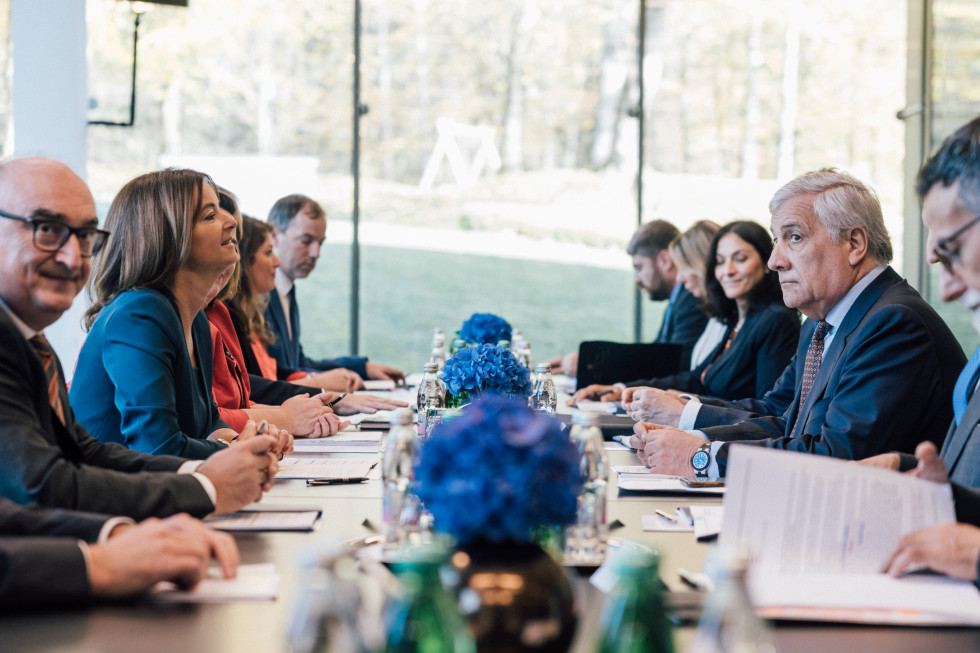Foreign ministers of Slovenia and Italy commit to forward-looking cooperation

Bilateral meeting of Slovenian and Italian Foreign Ministers
In addition to the foreign ministers, the meeting was attended by the Slovenian Minister of the Interior, Boštjan Poklukar, and of the Environment, Climate and Energy, Bojan Kumer, the Italian Minister of the Environment and Energy Security, Gilberto Pichetto Fratin, and State Secretaries of the ministries of both countries responsible for the economy, natural resources and spatial planning, and agriculture.
"Slovenia and Italy have a broad-ranging partnership and good neighbourly relations. Our multilateral cooperation covers a variety of topics of common interest with concrete and far-reaching achievements, particularly in the field of economic cooperation where the results are excellent. With a €10.6 billion trade, Italy is our third most important foreign trade partner," said Slovenian Foreign Minister Fajon after the meeting.
Slovenian and Italian Ministers and delegations discussed practical and feasible ways to strengthen cooperation in a wide range of areas, including water management, sustainable development of fisheries, connectivity, energy, biodiversity, police cooperation, space technologies, strengthening climate resilience, organic seed production, start-up ecosystems and others.
Foreign Ministers discussed the possibility of a joint visit to the European Capital of Culture Nova Gorica and Gorizia 2025 next year. "The European Capital of Culture (ECOC) Go2025 is a unique project that connects two border towns, two countries and, above all, people on both sides of the border. While in the past, these two cities have grown and developed divided, they are now becoming a valuable source of inspiration, a beacon for the future of a united Europe, where the collective memory is a positive category that serves to overcome past divisions," underscored Minister Fajon.
Slovenian and Italian Foreign Ministers, Fajon and Tajani touched on the special role that the two national communities play in the bilateral relations. "Slovenia values the frank and constructive dialogue it maintains with Italy on all issues of importance to the Slovenian national community in Italy," said Minister Fajon.
On border controls, Fajon explained that Slovenia remains a fervent advocate of a fully functioning Schengen area, but due to the current security situation it is not possible to lift the controls in place at the internal Schengen borders with Italy. "I am pleased that the two interior ministers regularly engage in intensive communication with a view to making life easier for people living at the border," she added.
The Slovenian and Italian sides also exchanged views on current international challenges, in particular the crisis situations in the Middle East and Ukraine. Slovenia, as a non-permanent member of the UN Security Council, and Italy, as the current G7 chair, underline the importance of dialogue between global partners on issues and challenges affecting international peace and security.
At the end of the Coordination Committee meeting, Slovenian Minister of Foreign and European Affairs Tanja Fajon and Italian Minister of Foreign Affairs Antonio Tajani signed a joint statement committing to closer cooperation in the areas of security and migration, sustainable infrastructure and mobility, economic cooperation, environment, agriculture and fisheries, and science and universities.
The two Foreign Ministers also signed the Implementation Programme for Cooperation in Culture and Education 2024–2029, which covers concrete areas of cooperation within education and culture, as well as in the framework of international organisations and forums. It also contains important proposals for cooperation on the ECOC Nova Gorica 2025, with the aim of shaping a unified cultural and urban space in the united cross-border Slovenian-Italian region around Nova Gorica and Gorizia.
The Coordination Committee between the two countries was established by the Memorandum of Cooperation between the Government of the Republic of Slovenia and the Government of the Italian Republic, signed on 14 May 2007 in Brussels. The last meeting was held on 14 June 2021 in Rome, but in an adapted format due to the COVID-19 epidemic.
The Coordination Committee is composed of ministers or deputies responsible for foreign affairs and the interior, the economy, energy, the environment, infrastructure, transport, agriculture, universities and scientific research.

